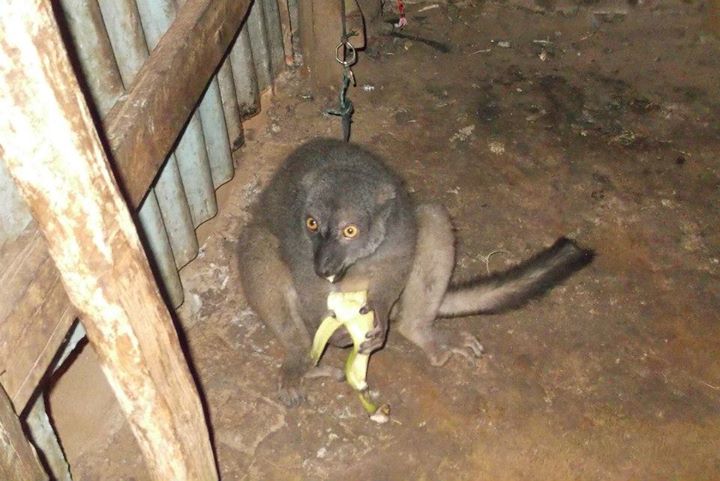Over 28,000 Endangered Lemurs Illegally Kept as Pets in Madagascar May Threaten Conservation and Survival of Species

Kim Reuter/Temple University A lemur being held as a pet in Madagascar.
The researchers published the findings, “Live capture and ownership of lemurs in Madagascar: extent and conservation implications,” online Jan. 5, in the international conservation journal, Oryx.
Led by Temple biology doctoral student Kim Reuter, the researchers spent three months in Madagascar surveying over 1,000 households in 17 cities and villages across the country’s northern half about pet lemur ownership, which is illegal.
“We’ve been spending millions of dollars on lemur conservation in Madagascar, but despite spending all this money, no one has ever quantified the threat from the in-country pet lemur trade,” said Reuter. “If we’re spending these millions of dollars there to preserve these species, we should actually examine all the threats facing lemurs.”
Reuter, one of the creators of the Lemur Conservation Network for which she serves as director of outreach and content, said that although pet lemur ownership is illegal, enforcement of the law seems to be relatively weak. She said that even though researchers and conservationists are aware of the activity, they have historically focused their efforts on mitigating other threats like deforestation and hunting.
“We estimated that over 28 thousand lemurs are kept illegally as pets in Malagasy cities over the last three years alone,” said Reuter, who has recently been appointed to the International Union for Conservation of Nature Species Survival Commission’s Primate Specialist Group. “You see it everywhere; even government officials and the people who are supposed to be enforcing the ban on pet lemurs own them.”
With at least 14 lemur species having populations of less than 10 thousand, Reuter said Madagascar’s extensive lemur pet ownership could be quickly driving some species closer to extinction, while even causing some populations to go extinct altogether.
“Now that we know that lemur pet ownership is happening, and happening at this scale, it’s an issue that we can’t ignore anymore,” she said, adding that lemur pet ownership must be factored into future conservation efforts.
“If people are going to keep lemurs as pets, then more outreach, regulation and enforcement is needed to ensure healthier captivity for the lemurs, especially in the big cities,” said Reuter, a research fellow at Conservation International while completing her Temple doctoral dissertation. “Conservation programs that don’t consider the pet trade of lemurs may unnecessarily increase their costs and risk extinction of the very lemur populations that they are trying to protect.”
In addition to Reuter, the researchers included Temple biology alumna Haley Gilles, Abigail Wills of the Mpingo Conservation & Development Initiative in Tanzania, and Temple Assistant Professor of Biology Brent Sewall. The research was funded by the National Science Foundation, Explorers Club and a Temple Faculty Senate grant.
Note: Copies of this study are available to working journalists and may be obtained by contacting Preston M. Moretz in Temple’s Office of Strategic Marketing and Communications at pmoretz@temple.edu.
Contact Information
Preston Moretz
Senior Research Writer
preston.moretz@temple.edu
Phone: 215-204-4380
Media Contact
More Information:
http://www.temple.eduAll latest news from the category: Ecology, The Environment and Conservation
This complex theme deals primarily with interactions between organisms and the environmental factors that impact them, but to a greater extent between individual inanimate environmental factors.
innovations-report offers informative reports and articles on topics such as climate protection, landscape conservation, ecological systems, wildlife and nature parks and ecosystem efficiency and balance.
Newest articles

NASA: Mystery of life’s handedness deepens
The mystery of why life uses molecules with specific orientations has deepened with a NASA-funded discovery that RNA — a key molecule thought to have potentially held the instructions for…

What are the effects of historic lithium mining on water quality?
Study reveals low levels of common contaminants but high levels of other elements in waters associated with an abandoned lithium mine. Lithium ore and mining waste from a historic lithium…

Quantum-inspired design boosts efficiency of heat-to-electricity conversion
Rice engineers take unconventional route to improving thermophotovoltaic systems. Researchers at Rice University have found a new way to improve a key element of thermophotovoltaic (TPV) systems, which convert heat…



